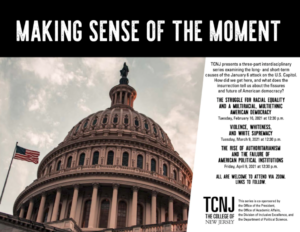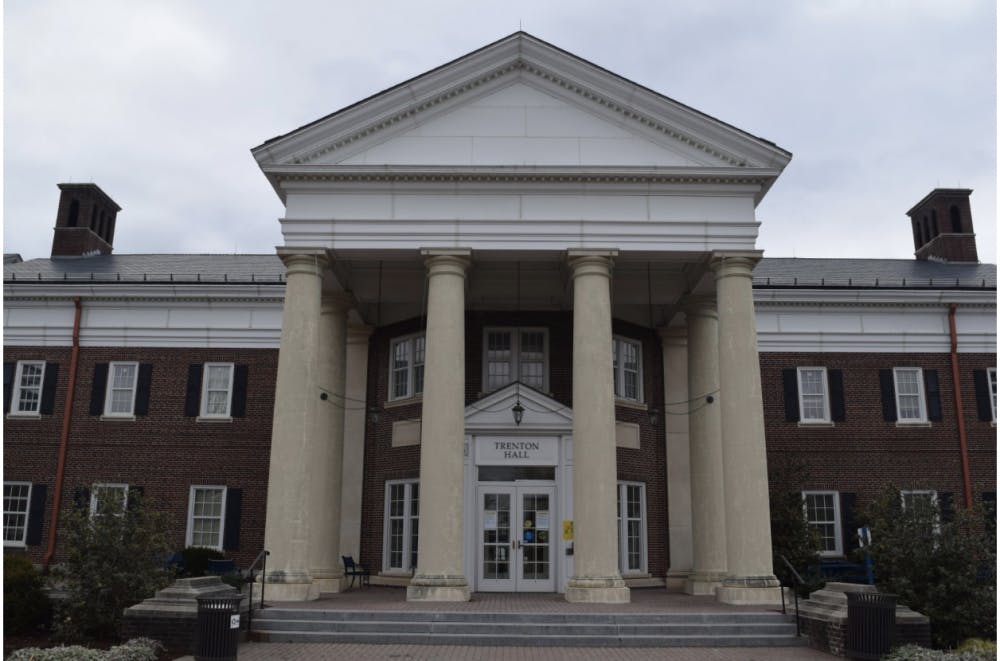By Julia Duggan
Senior Staff Writer
The College held a panel discussion with faculty members about the events that transpired on Jan. 6 at the Capitol. The discussion was moderated by President Foster and focused on evaluating the insurrection attempt. This is the second of three discussion panels aimed to examine and evaluate what happened on that day.
The four faculty members were professors Marcia O’Connell, professor of biology, Shaun Wiley, a professor of psychology who specializes in social aspects, Janet Gray, professor of women’s, gender and sexuality studies and Craig Hollander, associate professor of 19th century U.S. history, the history of slavery and Atlantic history.

Each gave a small presentation focusing on messages presented on violence, whiteness and white supremacy surrounding the invasion of the Capitol building. Audience members were invited to submit questions.
“My role today is to give some clarity to the question of race as a biological concept,” O’Connell said.
Her presentation started with explaining the history of naming species.
“Primarily based on their (species) appearance and geography, the methodology then extended that humans could be classified into distinct categories based arbitrarily on a single physical trait, skin color,” O'Connell said. “Which he (Carl Linnaeus) then used very limited data assigned to certain geographies.” Linnaeus was a scientist who proposed a classification system to name plants and animals.
Charles Darwin would later propose the idea that each species has a specific gene pool that creates the physical characteristics and allows each species to evolve in order to adapt to their environment. With this logic, humans would view each other as one race since considering the shared gene pool to draw from and evolve. However, since Linnaeus’ thinking was extremely popular, some people still believe that people should be separated by skin color when that does not make sense from a biological view.
With his background in psychology in social aspects, Wiley touched on four themes: white people misunderstanding equality, unjustified ownership of locations, evidence that some Americans see diversity as a threat and white people feeling uncomfortable knowing they are a part of systematic oppression.

“White Americans tend to think of racism in personal rather than structural terms, reducing it to prejudice, and we tend to emphasize disadvantages among people of color without considering how those disadvantages are linked to white racial privilege,” Wiley said.
Gray focused her presentation on how racism has been a common theme throughout politics and its existence in the present day. Sixty percent of the seats in Congress are currently held by white men, which is double the number of white males in the general U.S. population, Gray explained. She emphasized that white people who support white supremacy will target other white people and single them out if they do not also support the hateful ideology.
“White supremacy, the idea that white people are superior and should dominate all other people, refers to extremists ...The construct of waves that followed several centuries of Europeans justifying conquest, genocide, colonization, and enslavement of others based on notions of their arms superiority,” Gray said.
Hollander made comparisons between the events that led up to the crisis at the Capitol and a state house mob riot in South Carolina that happened in 1876 due to disputed election results.
“Two parties reached the so-called compromise of 1877, in which Republicans promised home rule for the South in exchange for the presidency,” Hollander said. “Home rule allowed for white rule without federal protection. The remaining Republican administrations in the South collapsed. The new all white Democratic administrations then gerrymandered districts and enacted all sorts of voting restrictions to keep their opponents from voting and that should sound familiar to today.”
Foster then led a Q&A portion of the discussion. When asked if the events that happened on Jan. 6 suggest a brighter or darker future, Hollander gave a concerned response.
“I know this is ironic because we're on a panel right now that is focusing on the events of January 6, but I am worried that by focusing too much on January 6 and what happened that we're missing the forest from the trees,” Hollander said. “That's what I was trying to convey in my talk...when everyone was focusing on South Carolina, they were missing the bigger picture… they were willing to claim victory in a presidential election and breathe a sigh of relief. At the same time what they traded away was democracy itself for a whole century.”







